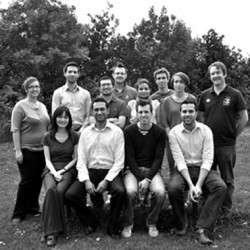 Medical graduates in the labs of the CSC
Medical graduates in the labs of the CSC
Bridging the gap between the hospital and laboratory is of pivotal importance in the promotion of translational research, but can be a struggle. The translation of scientific discoveries into medical treatments is rarely straightforward. However, the CSC recognises its importance with the Chain-Florey Clinical Research Fellowships. These Fellowships offer medical graduates the opportunity to complete PhDs in basic science at the CSC. Clinically trained Fellows have a unique appreciation of the practical application of treatments, and bring a valuable perspective to science research. The institute is pleased to announce the publication of a brochure to attract the brightest and best young doctors to the Chain-Florey scheme, with the backing of a number of the UK’s leaders in medical research.
Professor Dame Sally Davies, Chief Medical Office and Chief Scientific Adviser for the Department of Health comments that the scheme “is paving the way for great futures”. Professor Sir John Savill, Chief Executive of the Medical Research Council explains how, “the Chain-Florey scheme provides a fantastic opportunity for clinical Fellows to work with outstanding basic biomedical scientists at the MRC Clinical sciences Centre.”
The Fellowship is named in celebration of the great collaboration between Howard Florey, a clinically trained pathologist, and Ernst Chain, a biochemist, who shared the 1945 Nobel Prize in Physiology or Medicine with Alexander Fleming for their work in discovering, developing and producing the first antibiotic; penicillin. 14 Fellows now follow in these distinguished footsteps, driving medical science forward by studying the basics of health and disease. The brochure individually profiles the Fellows, their research and future ambitions.
Read an exerpt from Chain-Florey Fellow
Dr Jonathan Bond’s profile:
When he started his Fellowship at the CSC in 2009, Jonathan hoped his experience at the Institute of Child Health would help him acclimatise to the lab. “I thought I would hit the ground running…that it would be straightforward. It wasn’t. I don’t think it comes naturally, and it certainly takes a while to adjust to this way of thinking.”
Now fully adjusted, he nears the conclusion of his Fellowship and his research is starting to bear fruit. “I’m looking at transcriptional regulation in B cell development. My research focuses on the interplay between two transcription factors – Foxp1 and Ikaros.” Building on previous work done in Niall Dillon’s lab, which identified a physical interaction between these factors, Jonathan is investigating the mechanism and functional consequences of this.
“I’ve been looking at how the proteins interact by using co-immunoprecipitation, in vitro assays and cell culture. We’ve explored the functional aspect by overexpressing the proteins to see how the cells respond, and we’ve looked at how these factors bind DNA directly.” His investigations have identified a key link to leukaemia. The transcription factors together interact with a gene which codes for a protein called G2A. This protein is involved in leukaemia patients’ treatment response. “This discovery was a very exciting moment for me,” Jonathan recalls. “It helped link the research back to the clinical side of things. And it was quite serendipitous; none of us knew the gene before.”
Each Fellowship has provided unique challenges and rewards, but the experience is universally beneficial, and equips the Fellows with the rare ability to work across the medical and scientific worlds. In the words of Professor Jonathan Weber, Director of Research, Imperial NIHR BRC, “the experience will give Fellows not only the skills, but also the tools to ask fundamental questions about clinical issues in the most rigorous way.”
Click below to read the brochure, download a pdf here, or contact the PEMG facility for print copies or a high-resolution pdf:
For full application information, click here.
